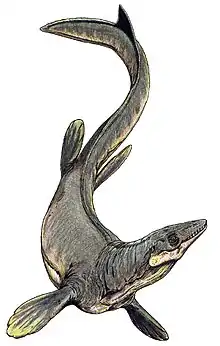| Moanasaurus Temporal range: Late Cretaceous, | |
|---|---|
| Life restoration | |
| Scientific classification | |
| Domain: | Eukaryota |
| Kingdom: | Animalia |
| Phylum: | Chordata |
| Class: | Reptilia |
| Order: | Squamata |
| Superfamily: | †Mosasauroidea |
| Family: | †Mosasauridae |
| Tribe: | †Mosasaurini |
| Genus: | †Moanasaurus Wiffen, 1980 |
| Species | |
| |
| Synonyms | |
| |
Moanasaurus (From Māori moana "sea" and Greek sauros "lizard"; meaning "Sea Lizard") was a genus of mosasaur from the Late Cretaceous period. Its fossil remains have been discovered in the North Island of New Zealand. Moanasaurus was a very large mosasaurine known originally from a disarticulated skull, vertebrae, ribs and flipper bones. The skull measures 78 cm (31 in) in length, which shows that Moanasaurus was one of the largest in the subfamily of Mosasaurinae.[1] Researchers argue that some Antarctic Mosasaurus remains (including a "large, fragmentary skull") may be attributed to this genus.[2]
See also
References
- ↑ Wiffen, J. (1980). "Moanasaurus, a new genus of marine reptile (Family Mosasauridae) from the Upper Cretaceous of North Island, New Zealand". New Zealand Journal of Geology and Geophysics. 23 (4): 507–528. doi:10.1080/00288306.1980.10424122.
- ↑ Martin, J.E. (2007). "Biostratigraphy of the Mosasauridae (Reptilia) from the Cretaceous of Antarctica". Geological Society, London, Special Publications. 258 (1): 101–108. doi:10.1144/GSL.SP.2006.258.01.07. S2CID 128604544.
External links
Wikispecies has information related to Moanasaurus.
This article is issued from Wikipedia. The text is licensed under Creative Commons - Attribution - Sharealike. Additional terms may apply for the media files.
